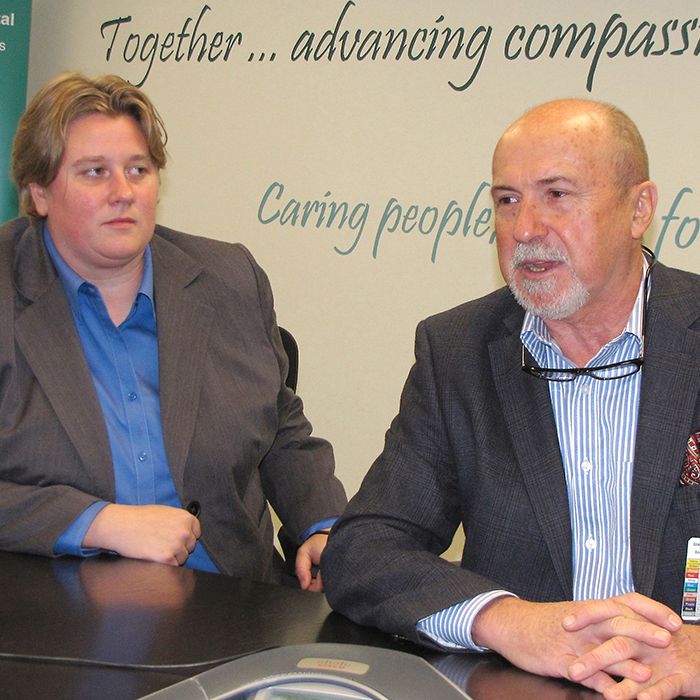
Facing a $2-million deficit, the Chatham-Kent Health Alliance is realigning services at its Chatham and Wallaceburg hospitals.
CKHA officials told a media briefing Friday that no programs for the broader community of Chatham-Kent are being eliminated.
However, the realignment will affect the equivalent of two-dozen full-time positions and move some services out of Wallaceburg.
According to Colin Patey, CKHA president and CEO, the changes are part of a long-term plan to cope with funding reforms by the Ministry of Health.
As opposed to making cuts across the board, Patey said they took a strategic approach to realign their services.
“This is not the time to be picking around the edges,” he said. “It requires courageous steps. But we must do everything we can to maintain access, safety and quality.”
The changes include consolidating endoscopy and complex continuing care onto the Chatham Campus.
By consolidating some of the care, Patey claimed some services would be enhanced.
For example, physiotherapy and occupational therapy can be extended to seven days.
In another move, the CKHA will seek to open new interim long-term beds at the Sydenham Campus. The hospital will provide space, but the beds will eventually be operated by a third party.
Sarah Padfield, CKHA vice-president and chief financial officer, said St. Andrew’s and St. Elizabeth Health Care have expressed interest in the idea.
Meanwhile, five medicine beds will remain at the Sydenham Campus in Wallaceburg and will be moved next to the emergency department for ease of access by staff and physicians.
And with the move to newer technology at Sydenham, core lab equipment will no longer be needed.
On the potential job losses, Padfield said the CKHA is working with the unions and staff to minimize the impact of losing 20 to 25 full-time equivalent positions.
”That doesn’t necessarily mean 21 people are without a job,” said Padfield, adding that one full-time employee and one part-timer were laid off last year when the CKHA had to cut more than 30 full-time positions.
Patey said the CKHA worked “extensively” with physicians and employees over several months on the realignment.
“They’re the ones who can tell us how things can change and add more value to the money being spent,” said Patey.
According to Patey, the future of the CKHA’s plan for Wallaceburg is a “campus of care” facility where an emergency department and some acute care beds would be the anchors for other health-care providers in the area.
Patey said the strategy was outlined in the CKHA’s “Imagine Project,” a plan that set out the vision for the alliance’s future programs two years ago and was the subject of “extensive” public consultation.
Supporters of the Wallaceburg hospital greeted the moves with disappointment and criticism.
“There’s a lot a spin,” said Wallaceburg Coun. Jeff Wesley.
He took issue with the CKHA’s attempt to cite the Imagine Project as an example of consulting the community on the changes.
“The other thing is we don’t think the Sydenham Campus should be entirely responsible for the vast majority of the deficit because I don’t think we’re creating it. I’d like to see a comparison.”
Wesley added the cuts don’t make sense because the hospital is used by many people who live outside Wallaceburg.
“If you have both Chatham and Wallaceburg campuses operating, you’re providing a lot better health care for the community of Chatham-Kent,” he said.
In other reaction, Monte McNaughton, Conservative MPP for Lambton-Kent-Middlesex, blamed the cuts on the Liberal government.
“The people of rural Ontario, and the people in Wallaceburg in this case, are going to have a different standard of care than people in urban areas,” said McNaughton. “The Sydenham hospital, quite frankly, has been gutted with today’s announcement.”
McNaughton held a news conference in Wallaceburg shortly after the CKHA’s media briefing.
“The cutbacks to Ontario’s small-town hospitals and specifically in Wallaceburg, are a direct result of the provincial government’s total lack of priorities. It wasted billions of dollars, whether it’s on canceling a gas plant or the E-Health scandal. That’s money that should be going for frontline patient care,” said McNaughton, before taking aim at the Local Integrated Health Networks. “We’re wasting over $500 million per year on the LHINs. It’s a layer of bureaucracy that doesn’t offer a frontline service.”
While he agrees some services need to be shared, he’s concerned about the future of the Sydenham hospital.
“The people deserve a hospital in Wallaceburg. They shouldn’t be second-class citizens. They donated a lot of money to have the hospital and the equipment there,” said McNaughton.





